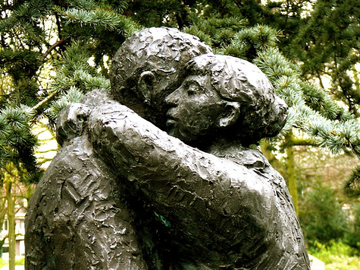 Have you ever done something really bad — so bad that you didn’t think you deserved to be forgiven? Sally, an addiction treatment graduate, recently told me that’s what being in recovery feels like a lot of the time. Fortunately, she said, people are more understanding than you might expect: “When you’re an addict, you feel like a horrible person, that you’ve done terrible things and people aren’t going to be able to forgive you. But when you work really hard to make yourself healthy and make amends, you find out that people actually have a different view of it.” I had the opportunity to hear some really inspiring stories from Sally and other rehab graduates. Here are a couple of the things they shared about sobriety, forgiveness, and moving forward. Christy’s life was unraveling — but her loved ones stepped up After surviving an accidental overdose while her children and nephew were home, Christy was at risk of losing custody of her kids. Her house needed major repairs before they were allowed back, and with Christy headed to treatment, she wasn’t sure how everything could get done. But then something amazing happened: her friends and family took action. “All these people said, ‘We’re not just going to stay back while your kids get taken away from you.’ They came and helped fix the house. “I thought, ‘I’m such a horrible person. Why would they do this for me?’” Christy recalled. She said seeing her loved ones join forces and not only forgive her actions, but actively help put her life back together, gave her a reality check into how much love is in her life. “I didn’t know that these people cared about me at all. I didn’t know why they would do anything for me after everything that I had done. But they just did — they just cared,” she said. Treatment helped Jeff find forgiveness both outside and within Entering Addiction Campuses’ Treehouse rehabilitation center in Texas helped Jeff find the courage to come clean about his drug use. “It’s all about being honest — you’ve got to be honest with yourself and you’ve got to be honest with others, and that’s hard. It’s especially hard to be honest with yourself,” he explained. Jeff said the clarity of sobriety and insight from his counselors and peers in treatment helped him learn to have the right mentality about seeking forgiveness even from himself. “It was amazing taking a step back and looking at what I’d done and being able to forgive myself and ask for forgiveness without dwelling on it,” he said. “You’ve just got to let it go. My fellow addicts helped me to do that with their stories.” Lincoln mended fences, but was grateful for where his journey led him The compassion he found in rehab helped Lincoln learn how to talk about his experiences, but he said making amends was more complicated than simply just apologizing. “I was blown away being at the podium and speaking to groups and not being judged. I talked to my father for the first time in a year and told him I was remorseful for the things I had done, but it was hard to be sorry — if things hadn’t happened the way they did, I wouldn’t be where I am now,” he told me. Ultimately, Lincoln said, it’s about letting go of your past and committing to being better in the future: “Everybody has a past. Nobody cares about the past. To me, the past is a non-issue,” he said. “You can’t judge someone on their past. If we’re judging someone on their past mistakes, no one will get out alive. I like to think, ‘What are you doing now to make yourself better for tomorrow?’” Photo from Pixabay
Cecelia Johnson believes strongly in the power of good deeds and recognizing great work. That’s why she created RecognitionWorks.org. The site is dedicated to connecting those who’ve been awarded for exemplary work in their communities to companies and organizations that can help them continue their admirable efforts through donations, sponsorships, and gifts. By making these connections, she hopes to build stronger, more altruistic communities and citizens.
0 Comments
Leave a Reply. |
ProgramsInformation |
Outreach |
|

